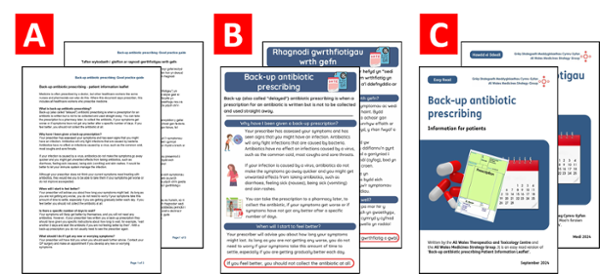Back-up antibiotic prescribing: Good practice guide
The aim of this guidance is to encourage more consistent implementation of a back-up prescribing strategy by all healthcare professionals in primary care. It is hoped that implementation of this guide will reduce unnecessary exposure to antimicrobials. Taking antibiotics unnecessarily can cause adverse reactions such as diarrhoea, rash and vomiting, and increases NHS costs as well as fuelling antibacterial resistance. One strategy to reduce unnecessary antimicrobial use in primary care is the use of back-up prescribing for specific self-limiting infections. The Royal College of General Practitioners (RCGP) supports back-up antibiotic prescribing for: acute otitis media; acute sore throat; acute rhinosinusitis and acute cough/acute bronchitis. The National Institute for Health and Care Excellence (NICE) also advocate it’s use for the management of a certain cohort of patients with a simple UTI. Patients are encouraged to self-manage their infection, with antibiotics only used if symptoms persist or worsen at any time. This document details guidance on the appropriate use of back-up antibiotic prescribing for specific self-limiting infections, the strategies that can be used and good practice points when implementing the strategy in primary care.
This back-up antibiotic prescribing guide has been prepared by a multi-professional collaborative group following discussions within the Primary Care Workstream Group of the Antimicrobial Resistance Delivery Board. The guide is relevant to everyone involved in the prescribing, dispensing, issuing and administration of antibiotics for self-limiting conditions.
⇩ Back-up antibiotic prescribing: Good practice guide 1,647KB (PDF) |
(October 2024)
Individual resources:
- Recommended antibiotic course durations 89KB (PDF)
- Back-up antibiotic prescribing summary 204KB (PDF)
- Receptionist antibiotic resource 337KB (PDF)
- Quick reference guide 175KB (PDF)
- Useful patient resources 35KB (PDF)
Patient Information Leaflets:
These patient information leaflets include key information for patients when they are given a back-up antibiotic prescription. They cover commonly asked questions and definitions of useful terms. The leaflets are available in three formats (A, B and C). Format A is text only, format B has words and pictures, and format C is Easy read version.

- Back-up antibiotic prescribing: Good practice guide - patient information leaflet - Format A (English) 108KB (PDF)
- Back-up antibiotic prescribing: Good practice guide - patient information leaflet - Format A (Welsh) 71KB (PDF)
- Back-up antibiotic prescribing: Good practice guide - patient information leaflet - Format B (English) 1,178KB (PDF)
- Back-up antibiotic prescribing: Good practice guide - patient information leaflet - Format B (Welsh) 1,191KB (PDF)
- Back-up antibiotic prescribing: Good practice guide - patient information leaflet - Format C (Easy read) (English) 560KB (PDF)
- Back-up antibiotic prescribing: Good practice guide - patient information leaflet - Format C (Easy read) (Welsh) 589KB (PDF)
(Patient information leaflets published October 2024)